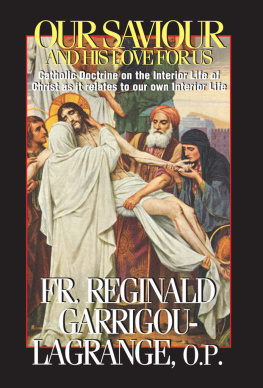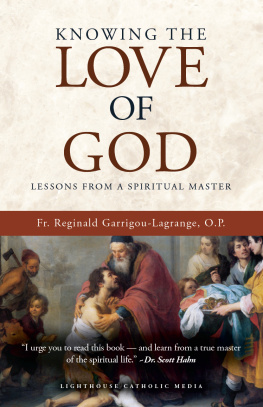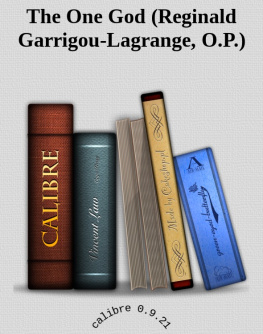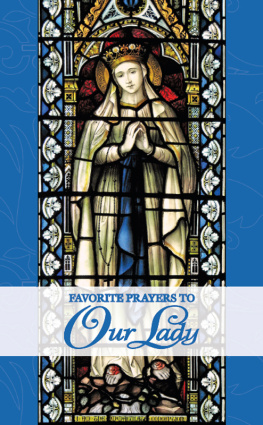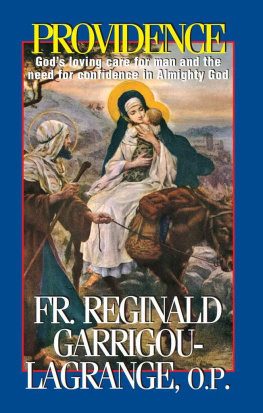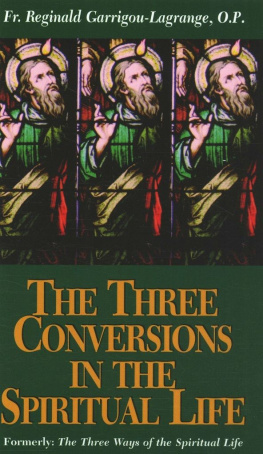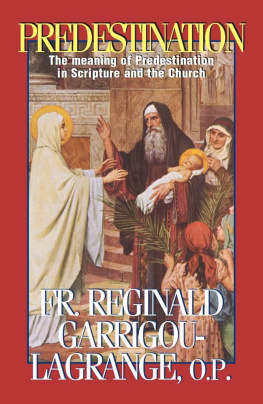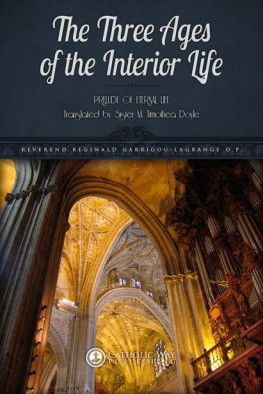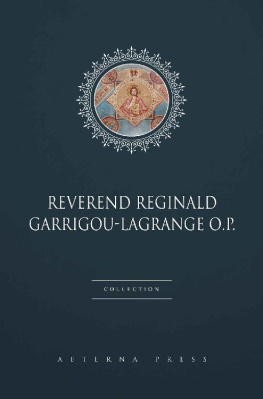Our Savior and His Love for Us
Fr. Reginald Garrigou-Lagrange, O.P.
Nihil Obstat: Innocent Swoboda, O.F.M.
Censor Librorum
Imprimatur: Joseph E. Ritter
Archbishop
St. Louis, Missouri
August 13, 1951
Translation copyright 1951 by B. Herder Book Co. Originally published in 1951 by B. Herder Book Co., St. Louis.
This book is a translation of Le Sauveur et son amour pour nous. Republished in 1998 by TAN Books by authorization of Les ditions du Cerf, Paris.
The type in this book is the property of TAN Books, successor in interest to B. Herder Book Co. of St. Louis, Missouri.
Library of Congress Catalog Card No.: 98-61397
Cover illustration by Janssens.
TAN Books.
Charlotte, North Carolina
www.TANBooks.com
2013
TRANSLATOR'S NOTE
Excerpts from St. Thomas' Summa theologica are taken from the translation published by Benziger Brothers, 1947.
PREFACE
I N an earlier work, Providence, we sought to explain, according to revelation and theology, the nature of divine Providence, its extension and infallibility, and the way we must confidently abandon ourselves to it by fulfilling our duties a little better each day. We have also shown in that work how conformity with God's signified will permit us to abandon ourselves to His will of good pleasure even before it has been manifested to us. Thus, "fidelity and abandonment" is a maxim that preserves the equilibrium of the interior life in the face of two opposing deviations, namely, restless, sterile agitation, and lazy, quietistic indifference.
This book on the Savior is in a sense the sequel to the one mentioned above. Who, indeed, if not the Savior has made the correct notion of Providence, so often expressed in the Old Testament, prevail over the notion of destiny or of an unknown and irresistible linkage of events and causes? Who has liberated men from the clutches of blind fate, spoken of by the Greek poets? Who has enabled us to free ourselves from the bonds of fatality, of chance or ill fortune, of life's countless worries, of slavery to the passions? Who, if not He whom we call the Savior?
The greatest Greek philosophers sought deliverance in contemplation of the Sovereign Good, which they conceived variously, depending on whether they were more or less idealistic. But they admitted that this contemplation of the Sovereign Good was accessible to only a very few men. They themselves attained to it only for a few fleeting moments; and if they spoke of the life to come, it was in terms of a beautiful possibility. Even Plato expressed himself thus in the Phaedo, as did Seneca in one of his Letters to Lucilius (102).
The problem of men's individual destinies remained obscure, and the necessity resulting from the very nature of things weighed heavily on men's souls. There was nothing to do but to be resigned According to the Stoics, fate leads those who submit to her, but carries along in spite of themselves those who resist. The determinist doctrines from the Orient added still more to the weight of destiny.
The Savior came not only to deliver us from the stranglehold of fate, from the irresistible chain of known and unknown causes, and from the blows of misfortune; He came also to deliver us from sin, from injustice with respect to God and men. He came to justify us and to promise us, no longer as a beautiful possibility but as an absolute certainty, not only future life in the natural order, but eternal life in the supernatural order, participation in the intimate life of God: a life in which we shall see Him as He sees Himself and love Him as He loves Himself.
Belief in destiny has been superseded by faith in God's love for us and faith in Providence: "God so loved the world, as to give His only-begotten Son; that whosoever believeth in Him, may not perish, but may have life everlasting." The weight of destiny has been lifted, and our individual destinies are brighter. The Savior brings deliverance to all who do not through lust or pride resist the light and the grace of God. It is from this point of view that we shall consider the mystery of the redemptive Incarnation.
On several occasions we have explained to theological students St. Thomas' treatise on the Incarnation, making use of his principal commentators. We judge it useful for our present purpose to extract certain portions of this treatise that bear directly on the personality of the Savior, His interior life, and His love for us, and to present this material in a form accessible to all interior souls. In our presentation we shall go back as much as possible from theology to faith itself, since the latter is far superior to the former.
Theology helps us to discover the innermost meaning of the Gospel. The farther it advances the more, in a sense, it must hide itself. For, like St. John the Baptist, it must somehow disappear after announcing the coming of our Lord. It makes known the structure of the body of doctrine, but as is fitting it must express itself as much as possible in the terms of Scripture, that is, in God's own words. Thus theology tends upward toward faith, its source.
We frequently speak of the intimate life of God, which is especially the mystery of the Blessed Trinity. Likewise the interior life of the sacred soul of the Savior derives from the mystery of the Incarnation. We shall therefore consider the Savior's interior life first with relation to the mystery of the Incarnation, and then with relation to the mystery of the Redemption.
In Part One we shall seek to explain Christ's personality according to His own testimony and that of the apostles, His intimate life as it was and is eternally with relation to the fittingness and motives for the Incarnation. We shall consider Christ's sanctity, the fullness of grace that enriched His sacred soul from the first moment of His conception, and that radiates through all His faculties: His intelligence, His will, and His passions.
In Part Two we shall deal with the mystery of the Redemption and of the Savior's love for us, dwelling on His humility, His prayer, His merits, His priesthood, the sacrifice of the Cross and that of the Mass. By thus contemplating at close range the intimate life of Jesus on earth, in heaven, and in the Eucharist, we shall learn how we must go about entering into His close friendship and how the mystery of Christ is bound up with the mystery of our own individual destinies.
We have set out to write neither a treatise on technical theology nor a popularization. Our purpose is to invite interior souls to the contemplation of the mystery of Christ.
To this end, two different pitfalls are to be avoided. Often, even on this subject, the spirit of technical research, when it succeeds in avoiding pedantry, turns the mind to minutiae, and this result is always detrimental to contemplation. Even apart from any defect in theological exposition, a good manual of theology on the solution of the difficulties concerning the communication of idioms, transubstantiation, or the Eucharistic accidents will be of less help in preparing us for contemplation than Bossuet's Elvations sur les mystres or his Mditations sur l'Evangile. The majority of interior souls do not need to undertake much of the research which is indispensable to theologians. In fact, to understand these matters they would require a philosophical background that they do not possess and that in a sense would encumber them. For, even at the startin a different way, of coursethese theologically untrained souls are on a higher level. This truth was well understood by the great classical theologians who must ever be our models.
On the other hand, many popularizations, and many pious books as well, lack a solid doctrinal foundation. Yet, far from being separated or merely juxtaposed, sacred doctrine and piety ought to be closely united, the latter springing spontaneously from the former.
Next page
